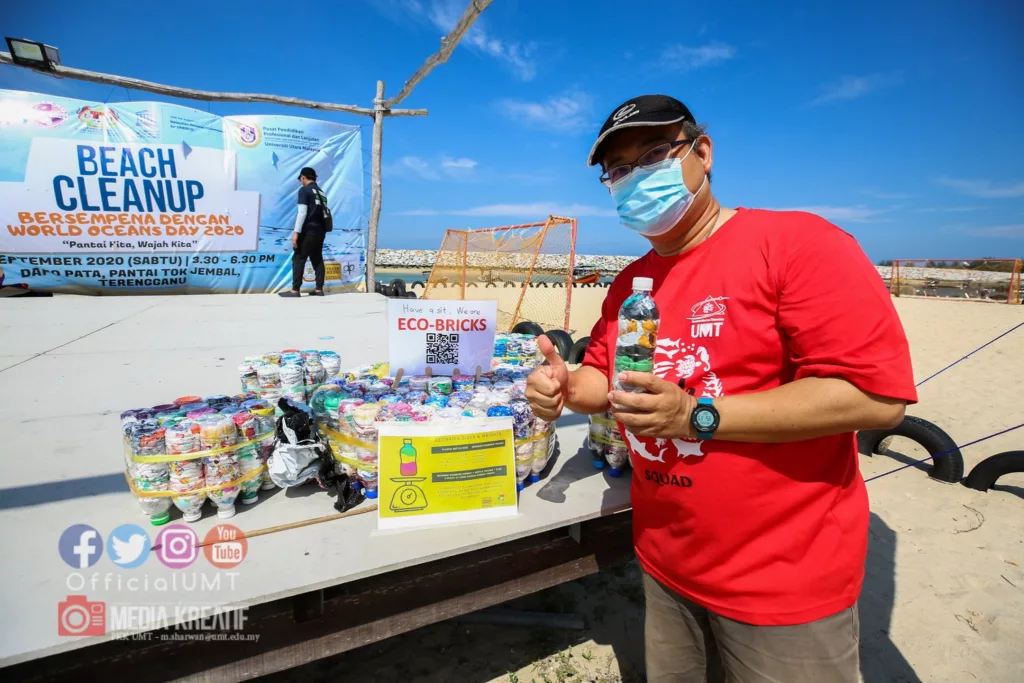UMT | Portal Rasmi Universiti Malaysia Terengganu

Tuesday, 03/11/2020
Share This Article :
One of the global issues that has been the subject of many discussions all over the world including Malaysia is the excessive and unmanaged disposal of solid waste, including that of plastic. Many people have the notion that it is of little impact when they throw away items such as candy wrappers or cigarette butts, due to their small size. But, imagine one million people throwing away these small-size candy wrappers. Would not the impact be greater?
According to a study by Solid Waste and Public Cleansing Management Corporation (SWCorp), each day it is estimated that an average Malaysian produces roughly 33,000 tons of solid waste, which amounts to 12 million tons per year. Almost 45 percent of the waste is that of food, 25 percent plastic-based materials, 10 percent paper, and the rest other types of solid waste. It is estimated that almost 95 percent of the solid waste will end up at landfills. This reflects poor management of waste in this country. This matter must be taken more seriously by all parties, including every individual in our society. Proper management of waste by all parties is required to handle this issue.
To increase the awareness and understanding of the public regarding the management of waste especially plastic, Prof. Ts. Dr Che Mohd Ruzaidi Ghazali, lecturer of environmental technology at the Faculty of Ocean Engineering Technology and Informatics, Universiti Malaysia Terengganu (UMT) has shared a few facts about plastic. He appeared recently on UMT Professorial Talk Programme that was held online.
According to Prof. Ruzaidi, all this while there have been too many misconceptions in the society regarding waste, especially plastic waste, that have compelled us to take the short cuts by throwing it away and let it end at landfills. Such acts will be a great threat to other forms of life on land and in the sea.
“The general assumption that says that all plastic materials are hazardous to health is not true. There are some plastic materials that can pose harm if they are exposed to a certain condition such as high temperature that causes the release of specific substance previously added to the plastic materials,” he said.
Prof. Ruzaidi said that a study by Cancer Research Centre of the United Kingdom found that there is no evidence showing that plastic containers commonly used for food and drinks can cause cancer. Frequent reusing of mineral water bottles has no correlation with the disease either.
Prof. Ruzaidi said we should be more concerned with our use of paper, which all this while is considered more environmentally friendly compared to plastic. It is clear that paper is not the best alternative or the safest because its use causes greater air pollution than that of plastic. Production of paper causes the air pollution to exceed 70 percent compared to production of plastic, whereby the release of green house gases and toxic substance is in higher quantity. Production of paper also involves cutting of big, mature trees that provide the main source of oxygen to living beings in world.
Prof. Ruzaidi also said that well-planned waste management needs to be implemented so that we can effectively handle the problem of solid waste before it becomes worse. The 4R principle, reduce, reuse, repair, and recycle, needs to be carried out integratedly by all parties, so that the environment can be sustained and inherited to future generations. The policies and society’s practices need to go hand in hand to make the campaign succesful. Our efforts to educate and train the society to separate rubbish by different categories will be futile if the rubbish lorries come and simply gather all into the lorries and take it to the landfills where it is mixed with other types of rubbish.
Collective effort in managing waste by all parties carrying out their duties is the key to ensuring the success in handling the issue. This effort is not easy to achieve within a short span of time, but it is not impossible to be implemented in this country. As an example, Kamikatsu, Japan, succeeded in solving the problem of solid waste pollution through a campaign called Zero Waste.
For further information, please contact:
Prof. Ts. Dr. Che Mohd Ruzaidi Ghazali
Faculty of Ocean Engineering Technology and Informatic, Universiti Malayisa Terengganu (UMT)
Tel : 0194562610
Translated by:
Corporate Communication Centre
Universiti Malaysia Terengganu
Original version in Malay by:
Tengku Nuriah Tengku Abdul Rahman
Student Affairs and Alumni Office, UMT